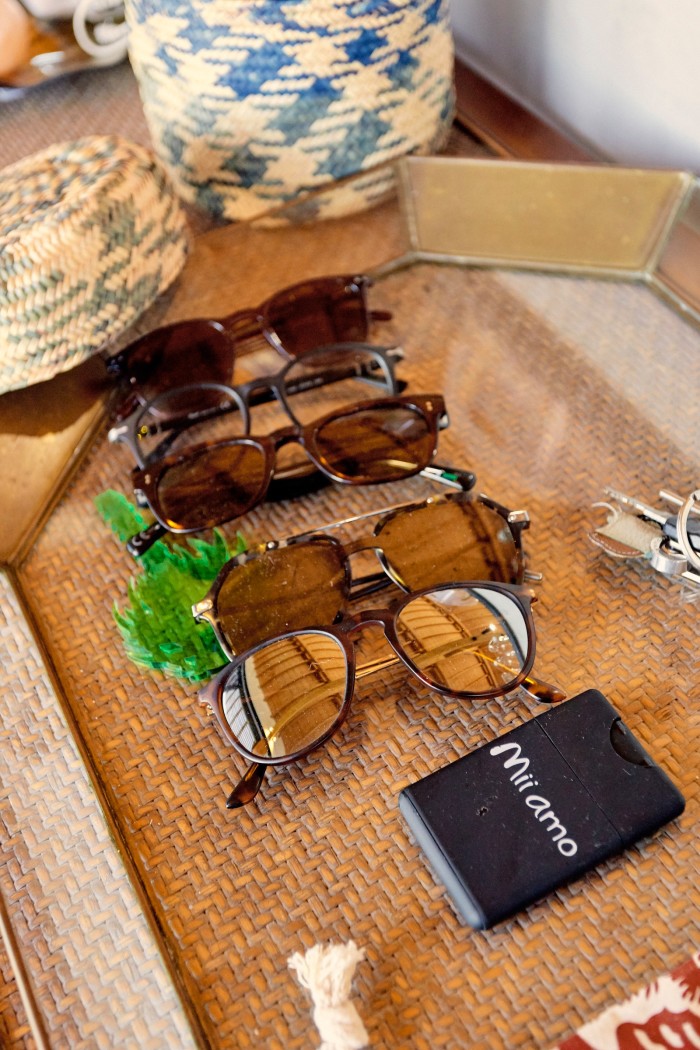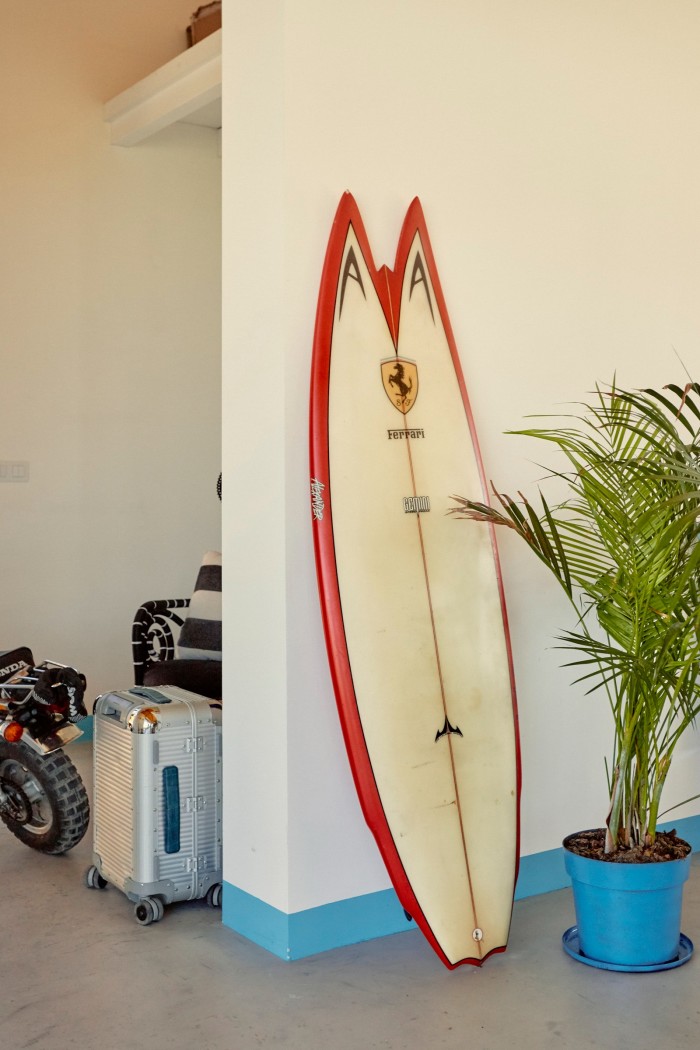The shared passions of Lapo Elkann and Simon de Pury

Roula Khalaf, Editor of the FT, selects her favourite stories in this weekly newsletter.
Swiss auctioneer Simon de Pury and Italian creative and philanthropist Lapo Elkann share many interests. Both men love art: de Pury as a dealer, adviser and curator; Elkann as a collector. “And football,” smiles Elkann, “although we don’t love the same team. He loves Arsenal. I love Juventus.”
They also share a passion for music: “We follow it as closely as contemporary culture as a whole,” says de Pury, who is known to take to the decks to DJ (sometimes under the name of The Swiss Crocodile), and whose Spotify playlists shift from Harry Styles to Doja Cat to Max Richter. “And we both care about giving back,” says Elkann. “We’ve had a lot from life, so feel that it’s important to be generous with our time for purposes that are close to our hearts.”


In 2016, Elkann founded the Fondazione Laps (Libera Accademia Progetti Sperimentali) to combat “educational poverty”, focused on children and vulnerable groups. Its pandemic projects in association with the Italian Red Cross, Banco Alimentare (an Italian network of food banks) and other charities raised more than €3mn. More recently, Laps has supported aid initiatives for Ukrainian refugees. An ongoing project is Casa Laps, a programme that started in Madeira to support homeless families, and is planned to extend to other areas in Portugal and Italy.
De Pury, meanwhile, has played a role in raising several billion dollars as a charity auctioneer. “I am constantly asked to swing my gavel by cultural, medical, environmental or philanthropic organisations. I have one nearly every second week,” says de Pury. His presence encourages brisk bidding: in 2017, the live auction at the Leonardo DiCaprio Foundation Gala to fund climate and biodiversity projects raised more than $30mn in one night, while the amfAR auction last May fetched more than $17mn.


The connection between the two men stretches back to “a previous life”, says de Pury, now 72, referring to the 1980s, when he was curator of the Thyssen-Bornemisza art collection in Lugano, and Elkann, now 46, was a child. “I first met Lapo’s grandfather, Gianni Agnelli. I remember it very clearly because he is one of the most extraordinary men that I’ve met in my whole life.”
The Agnelli name is synonymous with Fiat, the Turin-based car manufacturer, which was founded by Giovanni Agnelli in 1899. His grandson Gianni took over in 1966 and is remembered not only for his business acumen and staggering wealth, but his fashion sense and playboy lifestyle. This went hand-in-hand with his devotion to (and later ownership of) Juventus FC. “If Lapo has inherited one thing from his grandfather, it’s his charisma,” says de Pury, sitting side by side with his friend at his Portuguese home: a relaxed, mostly open-plan space with a beachy vibe, walls of floor-to-ceiling glass doors, and the odd Fiat 500 popping out from a wall.


Today, the family firm – which merged first with Chrysler and is now part of the Stellantis conglomerate – is helmed by Elkann’s older brother John, but Lapo has been living up to Gianni’s legacy of fast cars, sharp suits and entrepreneurial verve. He started out in the family fold as director of worldwide brand promotion at Fiat – a role that saw him revive the dinky, retro Fiat 500. After a much-publicised and nearly fatal drug overdose in 2005, he rebounded with a new venture in 2007: eyewear brand Italia Independent.
“The beauty of life is that it has many cycles – you can recycle yourself and do different things in different phases and moments,” reflects Elkann, whose CV includes heading up the Ferrari Tailor-Made programme (the then-Fiat-owned brand’s customisation service). More recently, he launched Garage Italia Customs, a bespoke car showroom that opened in a Milanese petrol station in 2015. As well as souping up the bodywork, paintwork and upholstery of any make of car or motorbike – not to mention the odd boat, plane and helicopter – the space boasts a restaurant and café. “I love what Lapo has done – the place is stunning,” says de Pury. “It’s the result of his unique taste and artistic vision.”
Elkann nods. “Now I have reached a phase where I want to be more of an artist than of an entrepreneur,” he says. In 2021, he sold Garage Italia Customs (but still owns the Milan building), followed by the sale of Italia Independent last year, although he remains creative director of the company. In September, he launched a range of suits with sustainable Spanish brand Ecoalf. “In every phase of my life, Simon has always been someone I’ve reached out to for advice,” says Elkann, who also holds the title of godfather to de Pury’s youngest daughter, 12-year-old Diane Delphine. “It’s an honour to be able to exchange ideas with Simon. He is a visionary – he’s always pioneering.”


De Pury initially wanted to be an artist, and studied painting at Tokyo University of the Arts in the 1970s. His auction career spans high-profile roles at Sotheby’s and later at Phillips (renamed for a period Phillips de Pury and Company, when de Pury acquired the majority share). Nicknamed “the Mick Jagger of art auctions”, he has been profiled in a BBC documentary, The Man with the Golden Gavel, and played a cameo role in Emily in Paris. In 2020, he curated the inaugural exhibition programme for Newlands House gallery in Petworth, West Sussex, and launched the digital platform de PURY. As well as the de PURY Presents series of exhibitions – which most recently showed the ceramic work of Kenyan artist Lana Trzebinski – the site’s online auctions are conducted by a de Pury avatar.
One point of difference between the two friends is their approach to fashion. They sit at opposite ends of the sartorial spectrum: Elkann favours Italian tailoring in flamboyant rainbow-bright shades (but today is wearing a light-blue T-shirt, showing off tattooed arms), while de Pury sticks to a shirt and suit combo in navy, white and grey. “My way of dressing is phenomenally boring,” he says. “I’ve worn the same clothes for the past 50 years. One always says don’t judge a book by its cover – it’s covering up how wild I am inside.”
De Pury does, however, own many pairs of Elkann’s carbon-fibre Italia Independent sunglasses, “which I believe have become collector’s items in their own right”, as well as a T-shirt from a past collaboration with Adidas in a colour he calls Lapo blue. “It is very extravagant, with little crystals in the fabric. You’ll never see me wearing it – I’ve only worn a T-shirt once in my life – but I view it as a work of art.”


When it comes to art, the pair are “fully on the same wavelength”, says de Pury. “I went to see Lapo in his office once and he stood in front of this amazing painting by Basquiat and Warhol, which is one of my absolute favourite collaborations.” Between 2003 and 2008, Elkann was on the board of Phillips alongside de Pury: “My knowledge of art is nothing compared to Simon’s, but it is a passion of mine,” he says, adding that being taken to see art with his grandfather from a young age was a “humongous privilege”.
“Lapo’s taste is what I would call high and low,” smiles de Pury. “There’s a lot of fun, humour and a joy of life in his aesthetic,” he adds, highlighting Elkann’s displays of football jerseys and Formula One helmets. “The way he has arranged them, it becomes the most spectacular artwork.”
Elkann prefers not to dwell on the past but doesn’t shy away from talking about recovery. “I’m very proud of my sobriety,” he says. “It’s a day-by-day job. Every day is a success. I obviously have a great wife [in 2021 he married Portuguese former rally raid racer Joana Lemos, who is now the vice president of Fondazione Laps] and the truth is that I actually like recovery.” He removed himself from Instagram five years ago: “I have to say it’s a much better way of life. And giving scarcity of what you are doing makes it more interesting and intriguing.”
One thing that hasn’t changed, though, is Elkann’s no-holds-barred approach. “Every time I see Lapo, he sparks off a thousand ideas a minute,” says de Pury. When the two men meet up, they like to brainstorm together, and whether it’s about their individual projects or dreaming up future collaborations, the process, says Elkann, “is a bit like dynamite, in a positive way.”
Comments